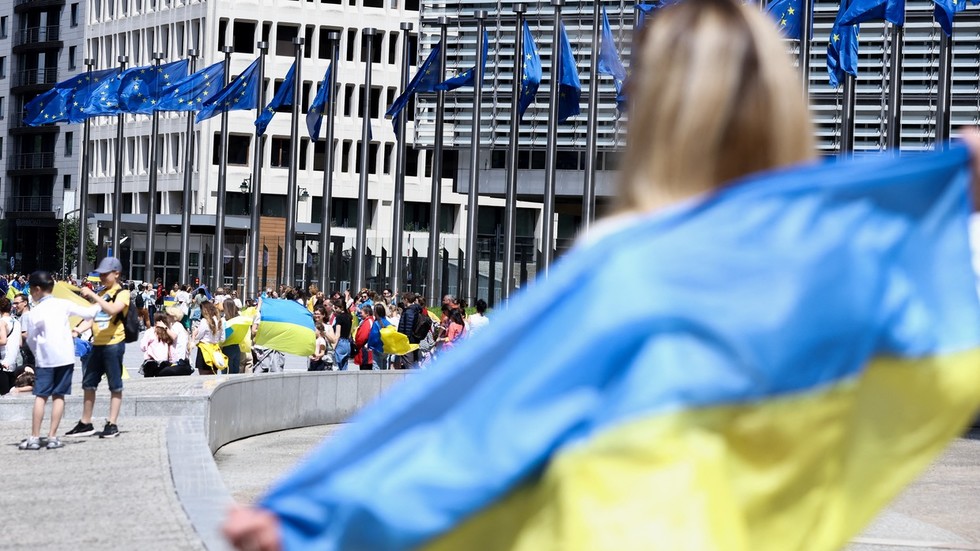The Commission presented on Friday its opinions on the applications for EU membership by Ukraine, Georgia and Moldova, recommending the European Council next week that all three of them should be given a European perspective and that Ukraine and Moldovia should be granted candidate country status.
Their applications were assessed on the merits of each country and in light of the Copenhagen criteria to join the EU: political criteria, economic criteria and the ability of the country to assume the obligations of EU membership (EU law or the acquis). The opinions also took into account their efforts in implementing their obligations under the current Association Agreements.
“Ukraine, Moldova and Georgia share the strong and legitimate aspiration of joining the European Union,” said Commission President von der Leyen at a press conference.
“Today, we are sending them a clear signal of support in their aspirations, even as they face challenging circumstances. And we do so standing firm on our European values and standards, setting out the path they need to follow in order to join the EU.”
“The Commission's opinions mark an inflection point in our relations. Indeed, this is a historic day for the people of Ukraine, Moldova and Georgia. We are confirming that they belong, in due time, in the European Union. The next steps are now in the hands of our Member States.”
The application process has been finalised in record time. The Council invited the Commission to submit its opinions on the applications on 7 March, only ca a week after the three countries have submitted their applications. The countries filled in the two parts of the questionnaires sent to them by the Commission within 1 - 2 months.
This was apparently possible thanks to the technical support given to them by the Commission which also used its own data about the three countries. However, a senior Commission official admitted at a technical briefing for accredited journalists that the Commission still has to finalise its analysis of their compliance with EU law.

Commissioner Olivér Várhelyi on the left, President Ursula von der Leyen in the middle and chief spokesperson Eric Mamer on the right, Credit: EU
“We expect member states to take forward decisions in the coming days, but our partner countries should already start working to deliver on their side on the key reforms outlined in our recommendation,” said Olivér Várhelyi, Commissioner for Neighbourhood and Enlargement. “This is crucial in order for Ukraine, Moldova and Georgia to move ahead on their EU path.”
Links to the three opinions can be found the Commission press release. Most questions to the Commission focused on its opinion on the EU application of Ukraine that is fighting a war of defence against Russia’s unprovoked invasion on 24 February.
The opinion summaries that, “Ukraine is a European State which has given ample proof of its adherence to the values on which the EU is founded.” It therefore recommended to the Council that Ukraine should be given the perspective to become a member of the EU.
Ukraine has also demonstrated the resilience of its institutions guaranteeing democracy, rule of law, human rights and respect for and protection of minorities, even under the stress test of the on-going war.
The Commission therefore recommended that Ukraine be granted candidate status, on the understanding that a number of reform steps are taken such as to enact and implement legislation and appointing judges and key civilian servants. This seems crucial since it was not evident if candidate country status would be given immediately or whether it was conditional on further progress in the reform process.
According to the opinion, the Commission will monitor Ukraine’s progress in fulfilling these steps and report on them, together with a detailed assessment of the country, by the end of 2022. This allows any country in the process to progress based on own merits but also means that steps towards the EU can be reversed if the underlying conditions are not met anymore.
In her presentation of the opinion, Commission president von der Leyen was aware of that not everything can be accomplished in the middle of a war but was optimistic that many of the reform steps are doable despite the war.
She asserted that Ukraine in the last eight years has gradually moved closer to the EU and already adopted or implemented 70 % of the acquis and 80 % of the recommendations on rule of law issues. She mentioned among others that decentralisation reform, an issue of dispute with Russia, had been a success but reminded that a law on national minorities still needs to be adopted.
The senior Commission official was also optimistic and asserted that Ukraine is functioning well during the war, with the Parliament in session and the government doing its business adopting and signing new laws. Whether the laws also can be implemented and enforced – which is a challenge for the public administrations in candidate countries in peace time – is another matter.
Ukrainians are fighting and dying for Europe and its values, President von der Leyen said. “We want them to live and Ukraine to become an EU member state.”
Today’s opinion encourages Ukraine to endure the suffering of the war and defend its independence and democracy for EU membership in the future. It also sends a strong political signal to both Ukraine and Russia and will hopefully lead to an end of the war and speed up a political solution.
M. Apelblat
The Brussels Times

